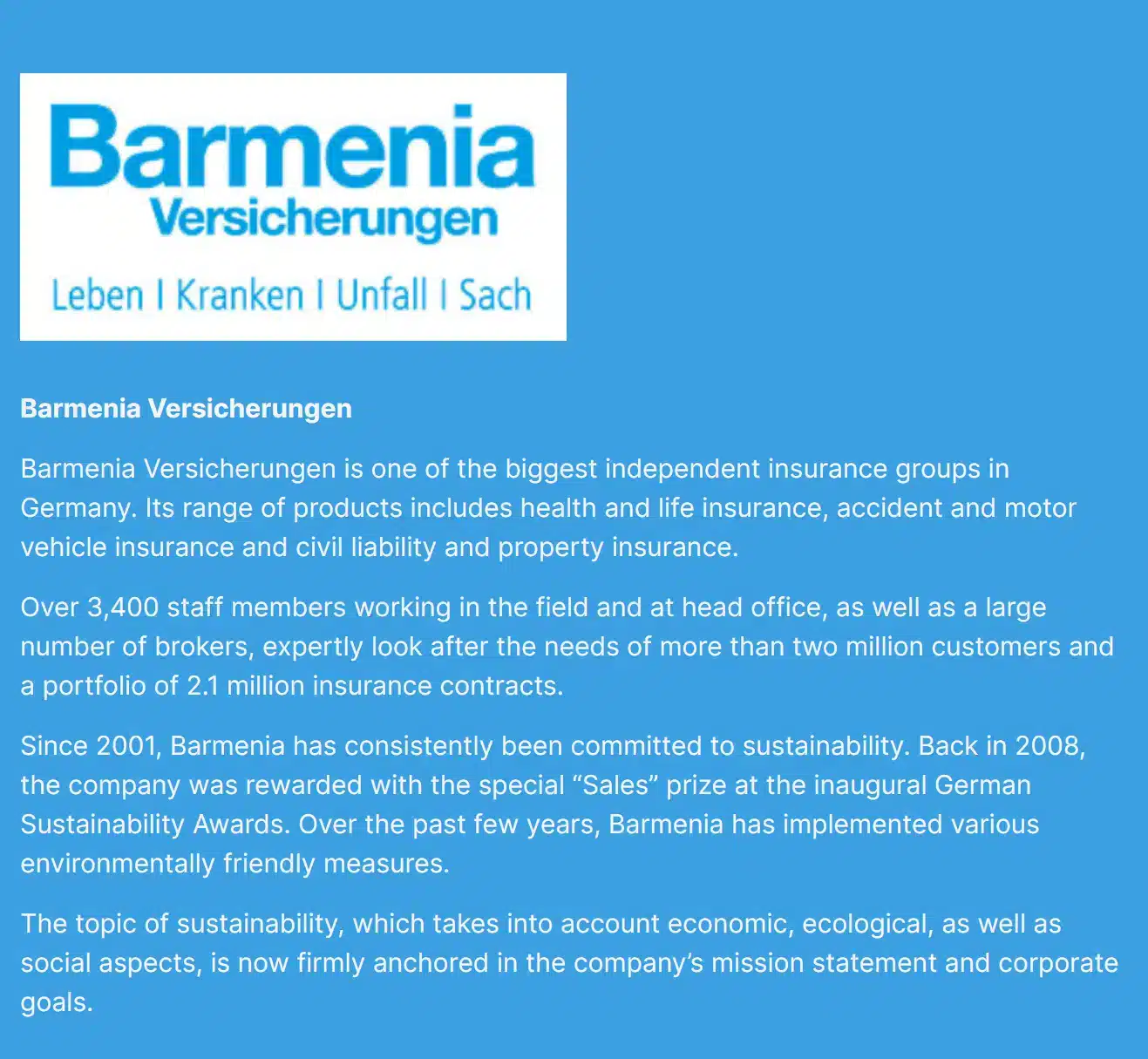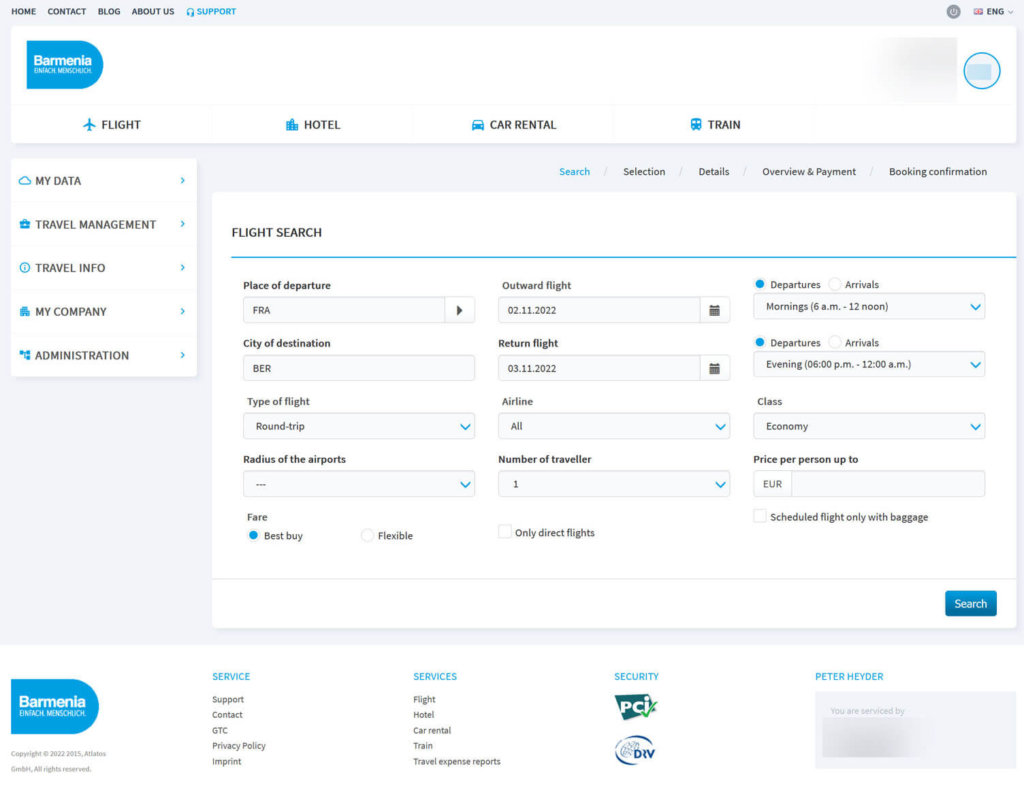A streamlined system and an efficiency boost
How Atlatos delivers
end-to-end processes in one system

Interview with Peter Heyder
Head of Staff Remuneration, Barmenia Versicherungen
In 2015, Barmenia Versicherungen introduced Atlatos Profi Traveller including Atlatos Expense Engine. This made it possible for us to take care of all our travel bookings and travel expense management as an end-to-end solution.
What was the initial situation at Barmenia Versicherungen before the Atlatos solution was introduced?
Trips were always booked by phone via a central travel agency. Travel department card transactions were checked manually by the accounts department, travel expense claims were created via the Intranet, and the PDFs generated in this way were still printed out and signed by the manager. The HR department then checked and manually entered the data for posting and payment in SAP. All in all, it was a very inefficient process.
What is Barmenia’s booking and billing process like now?
95% of our trips are booked online via Atlatos Profi Traveller. Flights, rental cars and Deutsche Bahn train tickets are paid for centrally via the AirPlus company account. All expense details are uploaded to Atlatos Profi Traveller, then compared with booking data and corrected if necessary. The system automatically creates prepared travel expense claims containing all booked services. Once the AirPlus expense details have been through a matching process with the booking data, services paid with AirPlus can no longer be changed or deleted. The employee then adds any expenses incurred on site, subsistence allowances and mileage allowance to the booked services.

Which interfaces have been implemented and how long was the preparation time?
Employees can easily access Atlatos Profi Traveller via single sign-on on the Intranet. The Atlatos master data is updated automatically and regularly via an interface from SAP HCM. The expense details are also exported in our desired format for SAP every day. It took six months to set up the interfaces and run the pilot phase until the system went live.
What are the advantages from the audit department’s point of view?
The first advantage is that all the costs of a trip, unlike in the previous process, are now included in the travel expense claim. This ensures transparency, for the approvers as well. Plausibility checks are integrated throughout the process, including compliance with our travel policies. This helps employees feel reassured that they aren’t doing anything wrong. We do not use any travel requests and trust our employees to make bookings that serve the company’s purpose. Following a trip, the manager approves the travel expense claim. This also approves all AirPlus transactions. The AirPlus invoice has already been paid and booked, but only on an interim account. The correct expense posting is only made once the travel expense claim has been approved by the manager and the HR department. Every AirPlus transaction thus goes through an approval process. If the employee has not completed the travel expense claim within three weeks of the end of the trip, they will be reminded of the “open” claim. If transactions remain on the interim account for a longer period of time, they are checked manually, since there is no approved travel expense claim for them yet.
I think that we have introduced an audit-proof travel process, from booking through to settlement and including AirPlus services.
What do employees think of the new process for travel bookings and travel expense claims?
The online travel booking system was very well received right from the start. Everything was suddenly so easy and bookable at short notice. However, we did get a large number of queries regarding travel expense claims, especially on the subject of “recording travel services booked via Atlatos and already paid for via AirPlus”. With the new system, these should now be included as travel expenses in the travel expense claim. Looking back now, I can only say that the entire end-to-end process has made things easier and has been very well accepted by all concerned.

What was the biggest challenge when it came to introducing the system? Have you got any tips for other companies?
In my opinion, it’s important to put together all the existing travel regulations/guidelines before introducing a new system. We managed to set up a uniform mandatory travel policy in advance out of several sets of regulations for office staff and sales representatives. This gave us a great basis for introducing the new travel software.
It was also important to ensure that all employees and managers were given detailed information about the background for the introduction and the new functions. As well as documentation and tutorials on the Intranet, mandatory multiplier training and online training sessions were carried out.
Support for travel expense issues was the biggest challenge for the introduction of the new system. First-level support for travel expense claims was provided by our HR department. In the first few weeks, we only had a few “experts” on the subject of Atlatos. These people had a heavier workload during this time of course. But that eased off after about six to eight weeks. We also had individual programming requests to make the processes more efficient for our HR department and these were implemented successively by Atlatos and by our own IT department.
It’s also important to have the support of management for the project. Otherwise, it makes it really difficult to achieve such a high online booking rate. The provision of IT resources for setting up the necessary connections is also important.
Would you recommend the simultaneous introduction of the online booking engine and travel expense management?
We have had very good experiences with the simultaneous introduction of the online booking engine, travel expense management and with Atlatos itself. It was clear to us that we needed a holistic solution if we wanted to plan something new.
As I’ve mentioned already, the introduction of a new system is not just about technology. Various processes need to be reviewed, including the travel policy, payment channels and methods and travel partners. The ideal situation is to bring all levels of hierarchy together around a central idea for the selection of a new software system.
Thank you very much, Mr Heyder, for the interview.
Give Atlatos Profi Traveller a go for free!
Are you ready to revolutionize the way you book business trips? Sign up for an online webinar with test access to see how Atlatos can optimise and streamline travel management for you.

Nelly Konetzny
Senior Sales Manager Northern Germany

